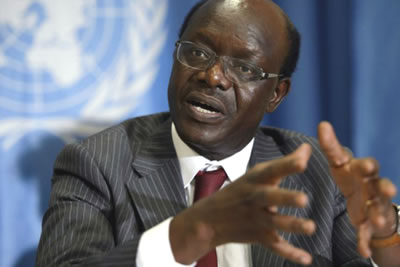Glimmers of hope remain in a gloomy picture for trade and development, UNCTAD Secretary-General Mukhisa Kituyi told the organization’s governing body on 1 October.
The committee of member states which oversees UNCTAD’s work, the Trade and Development Board, was meeting for the second part of its 2018 session.
Dr. Kituyi presented UNCTAD’s mid-term review, which looks at the progress it has made implementing the mandate it was given by governments at the most recent four-yearly ministerial meeting in July 2016.
The review comes half way between UNCTAD’s ministerial meetings, the next of which is due in 2020.

Dr. Kituyi said that the work programme given to UNCTAD in the mandate – named the Nairobi Maafikiano after the city in Kenya in which it was adopted and a Swahili word meaning “agreement” – was underway despite changing times for trade since 2016.
“We whispered about Brexit then but now we speak openly of trade war,” Dr. Kituyi said, pointing to a “crisis in multilateralism” that has gripped intergovernmental bodies such as the World Trade Organization in the last two years.
Debt-fuelled economic growth, increased capital flight and tit-for-tat tariff measures have changed the scene, he said.
However, this made UNCTAD’s mission to support developing countries in accessing the benefits of a globalized economy more important than ever.
Task-based approach
“In spite of the gloomy picture, there are glimmers of hope,” Dr. Kituyi said.
He noted, for example, that the March 2018 signing of the African Continental Free Trade Agreement by nearly 50 countries was a vote of confidence in trade as a means of boosting prosperity, as well as in multilateral forms of cooperation.
Responding to organizational reform called for in the Nairobi Maafikiano, Dr. Kituyi noted that UNCTAD is moving to a horizontal, task-based approach by creating cross-divisional working groups on statistical coordination, gender mainstreaming, financing for development and South-South cooperation.
This approach, he said, was also instrumental in strengthening delivery of the organization’s work on the ground, as seen in the European Union-UNCTAD programme for Angola, Train for Trade II – the largest UNCTAD country programme to date.
Following unprecedented interest in UNCTAD’s annual E-Commerce Week held in Geneva in the last two years, Dr. Kituyi told the meeting that Africa will be hosting the first regional version in December 2018. More such conferences are envisioned.
Dr. Kituyi also introduced the new director of UNCTAD’s trade and commodities division, Pamela Coke-Hamilton, to the Trade and Development Board. The former executive director of the Caribbean Export Development Agency took up her post in mid-September, and Dr. Kituyi said that, as a result, UNCTAD had achieved gender parity in its senior leadership.
Earlier, the Trade and Development Board’s president, Ambassador Salim Baddoura of Lebanon, called for a minute of silence to pay respects to victims of the recent earthquake and tsunami in Sulawesi, Indonesia.
He also took note of the intention by the State of Palestine to join the Trade and Development Board. The State of Palestine had earlier in 2018 exercised its right to join UNCTAD as a full member.


